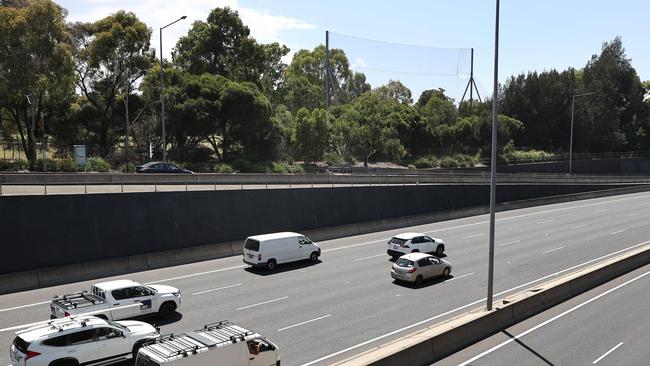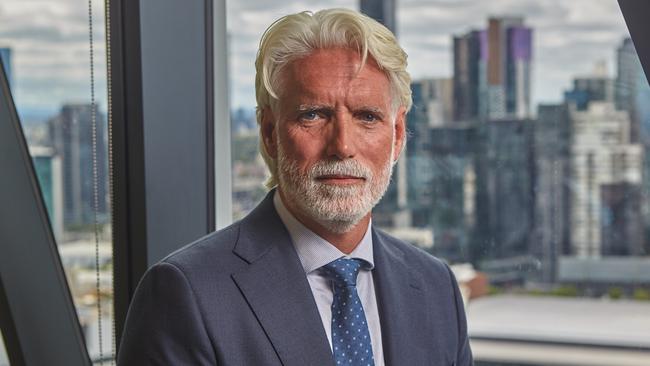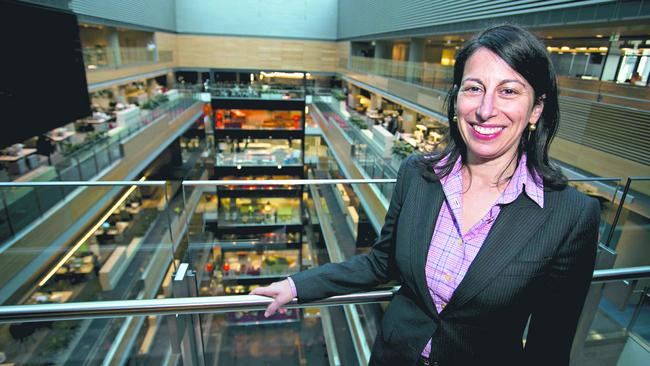Will Jablko be the next CEO of Transurban?
Banker turned company executive Michelle Jablko is among the frontrunners to take on the top job at Transurban from long-time boss Scott Charlton.

It’s a stark change for a former banker to be able to look outside their window and look upon real fruits of labour – in this case roads and tunnels – rather than unseeable ideas for takeovers or financial structuring.
“It’s the physical tangible nature of the business,” Michelle Jablko told her former boss, ANZ chief executive Shayne Elliott, in a fireside chat comparing her current role at Transurban Group as chief financial officer to the same role at ANZ. “Building things. You can look out your window and see it.”
If rumours are to be believed, Ms Jablko will soon be ruler of these roads, not just the woman behind the numbers.
Transurban has almost wrapped up its global hunt for a new CEO with the help of recruitment firm Russell Reynolds and will provide an update to the market at its full year results on Wednesday.
Former banker Ms Jablko is viewed as the frontrunner of internal candidates, ahead of the longer-serving Victoria and strategy boss Henry Byrne and partners and risk boss Hugh Wehby.
WestConnex CEO Andrew Head was also rumoured to be in the mix before his surprise resignation in May.
Macquarie Bank analyst Ian Myles said Ms Jablko is “a great candidate,” for the Transurban CEO job, as did other analysts who did not wish to be named.
Ms Jablko has certainly proved the exception to high-profile broker Angus Aitken’s rule that “former investment bankers tend to be crap at most things in the listed world” – a comment he made back in 2016 when she was appointed CFO of ANZ.
That comment and the response by ANZ’s then-PR chief Paul Edwards, who tweeted “Sexism alive + well in stockbroking?”, created the only public controversy to hit Ms Jablko.
The matter caused viral outrage and Mr Aitken quickly parted ways with Bell Potter, although he then took legal action against ANZ and the bank settled out of court. Mr Edwards, who tweeted an apology to Aitken, left ANZ not long after.

Ms Jablko, who started her career as a lawyer at Allens, kept her head down and kept kicking goals at ANZ, with Mr Elliot describing her after she departed as “an extremely hard worker” who does her “homework” and is “extremely diligent.”
To former colleague Grant Dempsey, who worked with her both in retail and investment banking, Ms Jablko is the epitome of a non-alpha modern leader, adding that “she will be an excellent CEO” when her time comes.
“She’s smart, very considerate and calm,” said Mr Dempsey, who last worked with her at ANZ.
“She is very respectful, even though she might be the smartest person in the room. She listens and works through what needs to be done. And she is a really decent person. To me, that is the modern leader.”
It is true that Mr Aitken’s view about former bankers has proved correct at times, Hamish Douglass — the former highly-regarded Deutsche Banker who founded and then partly felled Magallen Financial Group — being a case in point.
But he is certainly not always right.
Outgoing Transurban CEO Scott Charlton is himself a former Deutsche Banker. During his 11 years at the reins of Transurban, he turned it into the world’s biggest pure-play toll road company, knocking no less than Macquarie Bank-managed operators out of its way in the process.
Transurban now owns all the toll roads in Queensland, is the majority owner-operator in NSW, and owns two of the three in Victoria, with the state government in the process of building one more, and also has toll roads in North America.
Its shares have almost tripled in the time he’s been boss, on top of a steady stream of dividends.
While widely praised, “timing is everything,” when it comes to retiring and the likes of Mr Myles think the company is ready for a new CEO, with Ms Jablko, who lives with her family in Melbourne, a great choice.
“Scott oversaw a large expansion and the next person will take it their way … Michelle is an ideal candidate,” said Mr Myles, who admits that she is the candidate most visible to analysts.
Part of what sets her up well, he believes, is her ability to manage the various state governments.
“She is very competent and already involved in relationship building with the government, which is a really important part of the role,” Mr Myles.

Examples of when that comes to the fore include West Gate tunnel in Victoria, a project that has seen its budget almost double.
The site had an issue with toxic PFAS contamination and Covid-19-related problems, leading to a cost blowout – with Victorian taxpayers bearing an extra $1.7bn and Transurban having to stomach an extra $2bn and a time blowout, which means it is now expected to open in 2025.
It’s also tricky to keep customers – many of whom are struggling with the rising cost of living – onside when tolls keep rising. About 70 per cent of Transurban’s revenue is linked to the Consumer Price Index.
Case in point is the Eastern Distributor running between Sydney’s airport and the CBD, which now costs $9.19 for a normal car and the Hills M2 motorway, which costs $9.35.
These toll roads and tunnels operate as if in their own individual monopolies – there aren’t rival toll roads for drivers to choose from – which buffers Transurban from rising input costs impacting many other industries.
Mr Myles has an “outperform” rating on Transurban and said in his most recent research report that data around immigration, car registrations and increased traffic at airports suggest traffic growth is rebounding.
“Population growth has resumed at 1.5-2.0 per cent with immigration, and following on is total registration growth (June quarter), which has accelerated with Brisbane at about 3.4 per cent and Victoria at about 1.9 per cent,” he said in his report.
“These are record growth rates not seen for at least 5–6 years. Add to this passenger traffic at airports is up about 20 per cent on the previous corresponding period which will benefit CityLink, ED and Airportlink.”
Not that it’s all good news, of course. Transurban is struggling with the same labour shortage issues impacting many companies, and inflation is also a problem.
The Melbourne-based company also had a net debt to equity before interest, tax, depreciation and amortisation of 11 times last year, although analysts expect this figure to drop to between 8 to 7 times in the financial year just ended, because increased earnings will offset higher debt levels.
As the CFO, Ms Jablko has already ensured 97 per cent of the book is hedged, albeit at higher rates than previous years.
The 50-year-old had a storied career at UBS and then Greenhills as an investment banker before moving to ANZ as CFO and then to Australia’s biggest toll road operator.
If anyone can manage the 12 interest rate rises by the Reserve Bank since April 2022, it should be her.
Former colleagues at both UBS, Greenhills and ANZ have described her departure as “a loss,”
“We were disappointed when she left and know UBS was too,” said one banker didn’t want to be named.
Soon, Ms Jablko will find out whether her risky move out of banking will have paid off with one of the best CEO gigs in the country.





To join the conversation, please log in. Don't have an account? Register
Join the conversation, you are commenting as Logout